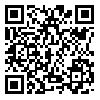BibTeX | RIS | EndNote | Medlars | ProCite | Reference Manager | RefWorks
Send citation to:
URL: http://ijpcp.iums.ac.ir/article-1-119-en.html
Abstract
Objectives: This study evaluated the psychometric properties of the Coping Responses Inventory for Youth (CRI-Y), assessing young adults undergoing treatment for cancer. The main goal of this study was to investigate the conceptual structure and reliability of this questionnaire in the Iranian cultural milieu (a kind of construct validity). In addition, the convergent and discriminative validity of this inventory that are other important psychometric properties of a test, are also assessed.
Method: Seventy-five individuals who were under chemotherapeutic treatment for leukemia in several cancer centers in the city of
Results: Principal Component Analysis of the CRI-Y scale did not replicate the original construct CRI-Y structure. Factor analysis of the principal components of the scale yielded four factors. Reliabilities for the scales, computed with Cronbach’s Alpha coefficients were satis-factory. Means of CRI-Y sub-scales showed that subjects were using both problem-focused and emotion-focused coping. Religious coping was significantly correlated with all factors. Anxiety scores were negatively correlated with CRI-Y factor 1 and 2, but correlated positively and significantly with CRI-Y factor 4. Anxiety scores were significantly correlated inversely with religious coping.
Conclusion: CRI-Y sub-scales can be used to indicate adolescents’ coping activities that significantly influence their anxiety.
Received: 2007/05/21 | Published: 2007/02/15
| Rights and permissions | |
 |
This work is licensed under a Creative Commons Attribution-NonCommercial 4.0 International License. |



